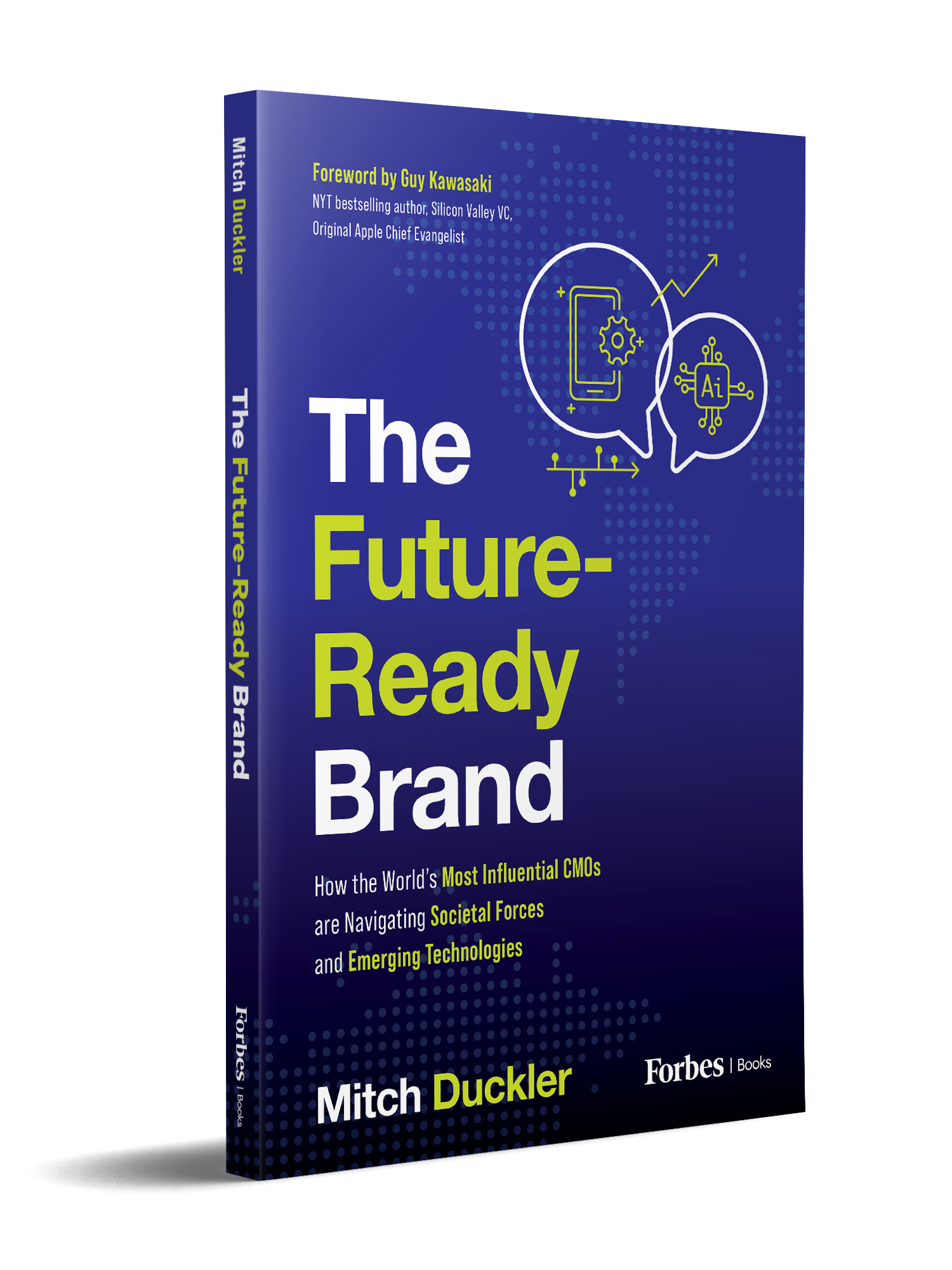Get ready to revolutionize your brand with Mitch Duckler, TEDx speaker, brand consultant, bestselling author, and founder and managing partner of FullSurge.
We discuss Mitch’s new book, The Future-Ready Brand: How the World’s Most Influential CMOs are Navigating Societal Forces and Emerging Technologies (ForbesBooks; May 14, 2024). It weaves insights from the world’s most influential CMOs into a new best practices workflow for navigating the future of branding.
___________________________________________________________
Ready to upgrade your Web3 marketing strategy? Don’t miss Consensus 2024 on May 29-31 in Austin, Texas. It is the largest and longest-running event on crypto, blockchain and Web3. Use code CMOSTORIES to get 15% off your pass at www.consensus2024.coindesk.com
Revolutionizing Shopping with Augmented Reality
Imagine walking into a store and having a digital assistant guide you directly to what you need, without having to ask for directions. Welcome to the future of shopping!
In this discussion, we'll be diving into the world of Augmented Reality (AR) in retail. We'll look at how AR transforms the shopping experience by providing customers with interactive and personalized services. From trying on clothes virtually to navigating stores effortlessly, AR is making shopping more engaging and efficient.
The impact of AR in retail is significant, offering benefits such as increased customer satisfaction, higher sales, and a bridge between the physical and digital shopping worlds. It's not just about the cool factor; it's about creating a seamless and immersive shopping experience that meets the modern shopper's expectations.
Curious about how AR is shaping the future of retail and what it means for you? Stay tuned as we answer these questions in detail.
The Future Ready Brand
Delving into the essence of "The Future Ready Brand," this book emerges as a beacon for understanding how the world's most influential Chief Marketing Officers (CMOs) are steering their brands through the rapidly changing landscapes of society and technology. It's not just a book; it's a roadmap for navigating the future of branding, marketing, and customer engagement.
The spark that ignited the creation of this book was a curiosity and a desire to understand how brands can remain relevant and thrive amidst the whirlwind of societal shifts and technological advancements. The author, Mitch Tucker, brings to the table his rich experience of over 30 years in brand and marketing strategy, having worked with giants like Coca-Cola and Lever. His transition from being on the client side to consulting has endowed him with a unique perspective on the evolution of branding in the face of emerging technologies and societal changes.
To sculpt the content of "The Future Ready Brand," Mitch embarked on an ambitious project, interviewing 43 CMOs from Fortune 500 companies. These conversations spanned across a wide spectrum of industries, offering insights into the challenges and opportunities faced by top brands in today's dynamic market environment. The process of gathering these insights was meticulous, involving deep dives into the strategies that have enabled these brands to not just survive but flourish.
The book is structured around three pivotal themes: societal trends, technological trends, and commercial and activation trends. Each of these sections sheds light on the forces shaping the future of marketing and brand engagement. Societal trends focus on the evolving expectations of transparency, purpose, and wellness from consumers, especially the emerging Gen Z demographic. Technological trends cover the groundbreaking advancements in predictive analytics, machine learning, extended reality, and the burgeoning field of Web 3.0, including blockchain and NFTs. Lastly, the commercial and activation trends section delves into how these technologies are revolutionizing brand activation through content marketing, gamification, and influencer marketing.
This exploration is not just about understanding the current state of affairs but is a forward-looking analysis that prepares brands to be future-ready. By dissecting these broad areas, "The Future Ready Brand" offers a lens through which businesses can anticipate changes, adapt strategies, and seize opportunities in a world where staying ahead means staying relevant.
The Role of AI in Marketing
As the digital age accelerates, Artificial Intelligence (AI) has become a cornerstone in reshaping marketing strategies. The power of AI to analyze vast amounts of data and provide actionable insights is revolutionizing how brands engage with their customers. At the heart of this transformation are two concepts: micro-segmentation and hyper-personalization.
Micro-segmentation takes traditional market segmentation to an entirely new level. Where once marketers grouped their audience into broad categories based on general characteristics, AI enables the creation of highly specific segments. This could mean dividing a market into hundreds or even thousands of micro-segments, each with its unique preferences and behaviors. This granular approach allows for hyper-personalization, where every aspect of the marketing message and offer can be tailored to the individual, from product recommendations to personalized pricing strategies. Imagine receiving offers that feel like they were crafted just for you, addressing your specific needs and desires. That's the promise of AI-driven marketing.
However, the integration of AI into marketing strategies is not without its challenges. Brand marketers face several hurdles, with data integrity being a prime concern. The adage "garbage in, garbage out" holds particularly true for AI. The quality of AI-generated insights and actions is directly dependent on the quality of the data fed into it. Issues such as data inaccuracy, biases embedded within algorithms, and the phenomenon of AI "hallucinations" — where the AI generates plausible but incorrect or irrelevant information — can severely impact the effectiveness of AI-driven marketing initiatives.
Another significant challenge is maintaining creativity and the human touch. While AI can enhance efficiency and provide insights at scale, it lacks the ability to empathize and connect on a human level. The fear is that over-reliant on AI could lead to a homogenization of marketing content, stripping away the unique brand voices and creative flair that attract consumers. Moreover, ensuring that AI-driven initiatives align with the brand's core values and identity is critical. There's a risk that AI-generated content or strategies might not fully resonate with or reflect the brand's ethos, leading to dissonant customer experiences.
To mitigate these risks, marketers must prioritize data accuracy and integrity, ensuring that the datasets AI tools learn from are as clean and unbiased as possible. Embracing AI as a tool to augment human creativity rather than replace it can help maintain the unique brand essence and emotional connections that are vital for engaging marketing. Furthermore, integrating AI tools that are capable of adhering to and enhancing the brand's voice and values can ensure that AI-driven marketing efforts remain authentic and true to the brand's identity.
In conclusion, while AI presents unparalleled opportunities for personalization and efficiency in marketing, navigating its challenges requires a balanced approach. By focusing on data integrity, preserving creativity, and ensuring brand authenticity, marketers can leverage AI to not only meet but exceed the evolving expectations of their audiences.

Mitch Duckler
Incorporating AI in Content Creation
The advent of Artificial Intelligence (AI) in the domain of content creation has opened up new avenues for marketers and content creators alike. The role of AI extends beyond just automating mundane tasks; it now plays a pivotal role in enhancing the creative process, from the initial stages of research to the final touches of content optimization. This evolution is reshaping the content marketing strategy, making it more efficient, personalized, and engaging.
At the outset, AI's role in content marketing research is indispensable. It aids in segmenting audiences more accurately and generating detailed outlines for content pieces. AI tools can brainstorm topics, create content briefs, and even suggest headlines that are more likely to resonate with the target audience. This level of precision in planning and research ensures that the content not only meets the needs of the audience but also aligns with the brand's marketing goals. For instance, an AI tool can analyze data from various sources to identify trending topics within specific micro-segments, enabling content creators to produce highly relevant and targeted content.
Moving on to the creation and editing phase, AI significantly reduces the time and effort involved in producing draft versions and refining content. Tools like AI-powered writing assistants can generate first drafts based on the briefs provided, which can then be fine-tuned by human editors. This collaboration between AI and human creativity ensures that the content maintains a high standard of quality while being produced more efficiently. Additionally, AI can assist in developing titles and headers that are optimized for search engines, thereby improving the visibility of the content online.
The concept of content versioning and curation with AI further exemplifies the versatility of AI in content creation. Content versioning allows for the same piece of content to be adapted for different platforms, audiences, or languages, significantly expanding its reach and effectiveness. AI can automate much of this process, ensuring consistency across versions while saving valuable time. Similarly, content curation, powered by AI, enables brands to discover and leverage user-generated content that aligns with their brand values and messaging, enriching their content strategy with authentic voices from their community.
Finally, the optimization of content using AI is a critical step in ensuring that the content not only reaches its intended audience but also engages them effectively. AI tools can analyze the performance of content across different platforms, providing insights into what works best for each audience segment. This data can then be used to tweak the content's tone, style, and format for better engagement and conversion rates. Moreover, AI can ensure that the content remains on-brand, adhering to the predefined voice and values of the brand, thus maintaining consistency and authenticity across all communications.
In essence, incorporating AI into content creation offers a multitude of benefits, from enhanced efficiency and personalization to improved engagement and brand consistency. However, it's important to remember that AI should be viewed as a tool to augment human creativity, not replace it. The most effective content strategies will be those that harness the analytical power of AI while preserving the unique insights and emotional resonance that only human creators can provide.
The World of Extended Reality
The concept of extended reality (XR) encompasses a broad spectrum of immersive technologies, including virtual reality (VR), augmented reality (AR), and mixed reality (MR). These technologies are collectively transforming the way brands interact with their customers, offering new avenues for engagement, storytelling, and customer experience. The impact of XR on brands is profound, enabling them to create immersive and interactive experiences that were previously unimaginable. For instance, a fashion retailer can use AR to allow customers to try on clothes virtually, enhancing the shopping experience and reducing the likelihood of returns.
With the emergence of the metaverse, a collective virtual shared space created by the convergence of virtually enhanced physical and digital reality, the implications for brands are significant. The metaverse offers a new digital frontier for brands to establish their presence, engage with audiences in innovative ways, and create unique, immersive experiences. Brands can set up virtual stores, host events, or create interactive experiences that transcend the limitations of the physical world. For example, a music brand could host a virtual concert within the metaverse, allowing fans from around the globe to experience the performance as if they were there in person.
However, navigating the metaverse comes with its own set of challenges and opportunities for brands. One of the primary challenges is the current technological limitations, such as the need for high-quality VR headsets and the lack of widespread adoption among consumers. Additionally, creating compelling content and experiences in the metaverse requires significant investment and expertise in these new technologies. Despite these challenges, the opportunities for brands willing to experiment and invest in the metaverse are vast. Early adopters have the potential to establish themselves as pioneers in this new digital space, building strong brand loyalty and engagement among tech-savvy audiences.
The importance of experimenting with extended reality and the metaverse for brands can't be overstated. In an era where digital engagement is paramount, XR offers a unique opportunity to stand out and connect with customers in meaningful ways. Brands that are willing to embrace these technologies, despite the uncertainties and challenges, will be better positioned to lead in their respective industries. Experimentation allows brands to learn, adapt, and innovate, ensuring they remain relevant in a rapidly evolving digital ecosystem. Whether it's through creating virtual try-on experiences, hosting events in the metaverse, or leveraging AR for product visualization, the potential applications of XR in branding are limited only by imagination.
In conclusion, as we venture further into the digital age, the role of extended reality and the metaverse in branding will only grow in importance. Brands that recognize and seize the opportunities presented by these technologies will be able to create deeper, more engaging relationships with their customers. By experimenting with XR and the metaverse, brands can not only enhance the customer experience but also pave the way for the future of digital engagement.
AI and XR in Real-World Applications
The integration of Artificial Intelligence (AI) and Extended Reality (XR) into real-world applications is revolutionizing industries by offering unprecedented levels of personalization and immersive experiences. A prime example of this innovative synergy can be observed in the cosmetic industry, where brands like Sephora are leading the way. By leveraging AI and AR technologies, Sephora has created a virtual try-on experience that allows customers to see how makeup looks on them without physically applying any product. This not only enhances the shopping experience but also significantly reduces the barriers to purchase, as customers can confidently make decisions based on the virtual representation of the product on their skin.
The role of AI in this context extends beyond just virtual try-ons. It plays a critical role in product recommendation and personalization, enabling a level of service that was previously impossible. For instance, when a customer is looking for a product that suits specific criteria such as skin type, complexion, and personal preferences, AI can sift through thousands of products to recommend the best matches. This capability is particularly beneficial in managing the complexity of large inventories, ensuring that customers are matched with products that meet their exact needs, thus enhancing customer satisfaction and loyalty.
Moreover, the practicality and public understanding of AI and XR technologies are becoming increasingly apparent. As these technologies become more integrated into everyday experiences, like shopping for cosmetics, the public's familiarity and comfort with them grow. This widespread acceptance is critical for the continued adoption and development of AI and XR across various sectors. The success stories in the cosmetic industry serve as a tangible demonstration of the benefits these technologies offer, making it easier for people to grasp their potential impact on other aspects of their lives.
Furthermore, the benefits of AI in managing product complexity are not limited to customer-facing applications. Behind the scenes, AI helps brands analyze consumer behavior, predict trends, and make informed decisions about inventory management, marketing strategies, and product development. This level of insight is invaluable in today's fast-paced market, where understanding and meeting consumer expectations quickly can be the difference between success and failure.
In conclusion, the practical applications of AI and XR in industries like cosmetics are paving the way for broader acceptance and understanding of these technologies among the public. By demonstrating their value in enhancing customer experiences and improving business operations, AI and XR are setting the stage for transformative changes across all sectors. As these technologies continue to evolve and integrate into more aspects of daily life, their potential to revolutionize how we live, work, and interact with the world around us becomes increasingly clear.
Influencer Marketing and the Creator Economy
In the rapidly evolving world of influencer marketing, a significant shift is underway towards the integration of virtual influencers. This transition marks a pivotal moment in the creator economy, where the lines between reality and virtuality blur, offering new opportunities and challenges for brands and marketers alike. Virtual influencers, designed with sophisticated AI, are beginning to make their mark alongside human influencers, bringing a fresh dynamic to the digital marketing arena.
At this early stage, virtual influencer marketing is still finding its footing, with brands experimenting to understand how best to leverage these digital personas. The allure of virtual influencers lies in their perpetual availability, control over messaging, and the absence of real-world scandals that can sometimes afflict human influencers. These AI-driven characters can be tailored to embody the perfect brand ambassador, consistently delivering content that aligns with the brand's values and aesthetic. For instance, a virtual influencer can be programmed to engage with audiences around the clock, in multiple languages, and across different cultural contexts, without the logistical challenges of human influencers.
However, the rise of virtual influencers is not without its controversies. The advantages they offer, such as control over brand messaging and the ability to avoid unforeseen public relations issues, come at the cost of authenticity—a cornerstone of successful influencer marketing. Critics argue that the very essence of influencer marketing is rooted in genuine, relatable human experiences, something that virtual entities might not fully replicate. This debate over control versus authenticity is central to the conversation around virtual influencers. While brands can dictate every aspect of a virtual influencer's persona, from their opinions to their interactions, this level of control might lead to engagements that feel manufactured, potentially alienating audiences seeking authentic connections.
The ongoing debate in influencer marketing circles revolves around finding the right balance between control and authenticity. Some marketers advocate for a hands-off approach, allowing human influencers the creative freedom to connect with their audience in a manner that feels genuine and personal. They argue that this authenticity is what drives engagement and loyalty, making influencer marketing so effective. On the other hand, the predictability and reliability of virtual influencers present a tempting proposition for brands looking to minimize risks and ensure consistent brand representation. This tension between the desire for control and the need for authenticity is shaping the future of influencer marketing, as brands and marketers alike grapple with these new digital dynamics.
In conclusion, as the influencer marketing and creator economy continue to evolve, the emergence of virtual influencers represents both an exciting opportunity and a complex challenge. The potential for these digital personas to transform brand engagement is immense, but it requires a nuanced understanding of the interplay between technology and human emotion. As brands experiment with virtual influencers, the lessons learned will undoubtedly contribute to the broader discourse on the future of digital marketing, influencer relationships, and the ongoing quest for authenticity in a virtual world.
The Impact of AI on the Marketing Function
The advent of Artificial Intelligence (AI) in the marketing sphere is not just a technological leap; it's a paradigm shift that promises to elevate the marketing function to unprecedented heights. The potential of AI to transform marketing from a support function to a strategic powerhouse is immense. By harnessing AI, marketers can now tap into deep consumer insights, predict market trends with greater accuracy, and tailor their strategies to meet the nuanced needs of diverse consumer segments. This evolution marks a significant departure from traditional marketing practices, positioning AI as a critical driver of growth and innovation within organizations.
At the heart of AI's transformative power is its ability to identify consumer needs and uncover growth opportunities with a level of precision and speed that was previously unimaginable. Through advanced data analytics, AI algorithms can sift through vast amounts of consumer data, identifying patterns, preferences, and behaviors that inform more effective marketing strategies. This capability enables marketers to anticipate consumer needs, tailor their offerings, and engage with customers in a more personalized and meaningful way. The result is not just increased customer satisfaction but also enhanced loyalty and brand advocacy, which are key drivers of long-term success.
Understanding the applicability of AI in marketing is paramount for today's marketers. It's not enough to be aware of AI and its potential; marketers must actively seek to understand how AI technologies can be applied to their specific context to drive value. This involves staying abreast of the latest AI developments, experimenting with AI-powered tools and platforms, and continuously learning from both successes and failures. By doing so, marketers can leverage AI not just as a tool for operational efficiency but as a strategic asset that informs decision-making, strategy development, and customer engagement.
The integration of AI into marketing heralds a shift in the role of marketers themselves. No longer just tacticians focused on execution, marketers are now co-owners of the growth agenda, working alongside other C-suite executives to drive business success. AI empowers marketers to contribute more significantly to strategic discussions, offering insights and solutions that are deeply informed by data. This elevated role requires a new set of skills and a mindset shift, as marketers must balance creativity with analytical prowess, intuition with data-driven decision-making. The promise of AI in marketing is not just in its technological capabilities but in its ability to transform marketers into strategic leaders who are integral to their organization's success.
In conclusion, the impact of AI on the marketing function is profound and far-reaching. By enabling more personalized customer engagement, uncovering new growth opportunities, and elevating the role of marketers within organizations, AI is redefining what it means to be a marketer in the digital age. As AI continues to evolve, its potential to drive innovation and growth in marketing is limitless. Marketers who embrace AI, understand its applicability, and integrate it into their strategic planning will be well-positioned to lead their organizations into a future marked by rapid change and boundless opportunity.
Wrapping It Up
As we come to the end of this insightful discussion, it's clear that the intersection of AI, XR, and influencer marketing is reshaping the future of brand engagement and marketing strategies.
The integration of AI and XR in retail, exemplified by Sephora's approach, offers a glimpse into the future of personalized shopping experiences.
The evolving role of virtual influencers in marketing campaigns highlights the balance between control and authenticity that brands must manage.
The potential of AI to elevate marketing to a strategic level within organizations underscores the importance of understanding and leveraging technology for growth.
Will the rise of virtual influencers and advanced AI technologies challenge the authenticity and human touch that have long been central to successful marketing? Only time will tell. Until then, let's keep exploring and adapting.

The Future Ready Brand: Insights from Top CMOs – with Mitch Duckler
KEY HIGHLIGHTS
[01:18] What inspired you to write this book, and could you briefly introduce yourself?
[04:21] How can CMOs, marketers, and entrepreneurs leverage marketing AI to gain competitive advantages?
[06:44] What are the primary challenges that brand marketers encounter with AI, and how can CMOs mitigate those risks?
[10:31] What are some best practices for using AI in content creation?
[12:32] Do you use the tools mentioned in your book for daily content creation and writing tasks, and how do they impact your work? Would writing a book be much harder without them?
[14:51] How can brands leverage VR, AR, and MR to benefit their customers?
[19:34] Can you elaborate on the comparison between human influencers and virtual influencers?
[22:03] Throughout your conversations with various individuals, have you had any particularly memorable insights or moments that stood out to you and sparked excitement? Could you share one of those experiences with us?
NOTABLE QUOTES
“AI should be an amplifier of human talent, it's not a replacement of it. And there are things that AI can do much better than human beings, especially the efficiencies that you mentioned earlier and the productivity. But also there are things that humans can do far better than any AI, right? And that is things like empathy, emotion, and creativity.”
“The technology and its advanced, sophisticated computer power allows you to almost come up with virtually an unlimited number of segments. There can be dozens or hundreds, even thousands of segments that you almost begin to approach this notion of one to one marketing, and that obviously was not scalable or possible before technology.”
“You can come up with interesting content or is interesting solutions, but are they true and authentic to your brand positioning? And I think that's somewhere where that we are making progress.”
“The outputs, deliverables that result from AI are only as good as the data that goes into, as you can imagine, just like anything else. And as we know, there are some inaccuracies, especially in generative AI, right, where we've all heard of the concept of hallucinations.”
“I think the third, and something that is very near and dear to me as a brand consultant is brand fit and authenticity, right? So you can come up with interesting content or is interesting solutions, but are they true and authentic to your brand positioning?”
MENTIONED RESOURCES
The Future-Ready Brand
The Indispensable Brand
FullSurge Website: https://www.fullsurge.com/
CONNECT
LinkedIn: https://www.linkedin.com/in/mitchduckler/






